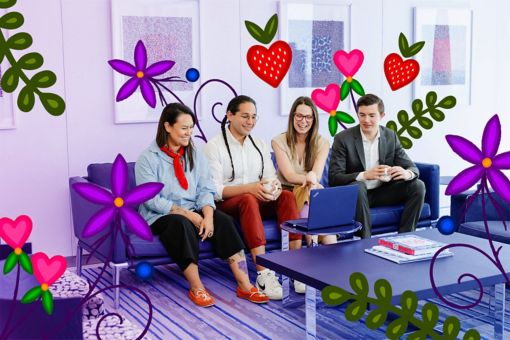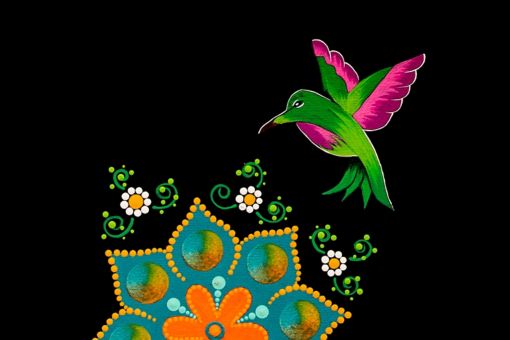Land acknowledgment
We respectfully acknowledge that KPMG offices across Turtle Island (North America) are located on the traditional, treaty and unceded territories of First Nations, Inuit and Métis peoples.
Indigenous Peoples share a sacred relation with the land and this land acknowledgment is the first step in learning about our history and taking action toward reconciliation.
Our Truth and Reconciliation Impact Reports
At KPMG, we’re committed to advancing truth and reconciliation through consistent and transparent progress against our Action Plan. We’re equally committed to sharing our journey as it unfolds, both to build trust with our people and in our communities and to ensure the impact we are making is shared as widely as possible.
Our Truth and Reconciliation Action Plan
A call to action
With Call to Action No. 92, the Truth and Reconciliation Commission of Canada called on corporate Canada “to adopt the United Nations Declaration on the Rights of Indigenous Peoples as a reconciliation framework and to apply its principles, norms, and standards to corporate policy and core operational activities involving Indigenous Peoples and their lands and resources.”
With this Truth and Reconciliation Action Plan, KPMG in Canada is formally answering that call.
We do this not only because — as a professional services and accounting firm — we are committed to a healthy and vibrant market-based economy, which is in turn dependent on healthy and vibrant people. We do it because it is just and right.
And just as there can be no reconciliation without truth, we believe there can be no meaningful action without a plan. As it is said: what gets measured, gets done. This plan is backed by clear KPIs that will allow us to track our progress, on which we will report annually.
The plan will also engage our entire firm, not simply an individual or two. This is by design. Among our core values are doing things together, for better. These values bind us as individuals and as a firm, but we also believe they are universal.
We therefore call on our colleagues, corporate peers and the people of Canada to do their part. Truth and Reconciliation is a collective journey and a shared responsibility. We all have a role to play.
This plan isn’t the first step KPMG in Canada has taken on this journey, nor will it be the last. But we mean it to be a big one — and bigger than ourselves. That, we believe, will be the true measure of its success.
Our vision and mission
Our vision is to make a widespread impact in advancing Truth and Reconciliation by co-creating strong, sustainable and respectful relationships with Indigenous Peoples; by dedicating resources and making investments that advance knowledge; and by enabling empowerment and equal opportunity for Indigenous Peoples to build prosperity for current and future generations.
Our mission is to advance an equitable and inclusive culture where Indigenous Peoples have sufficient supports to thrive and achieve their professional goals. We will do this by educating and raising awareness of the truth about the shared history of our country, building allyship, and serving as a trusted and active contributor in Indigenous communities and organizations to contribute to positive and sustainable socio-economic benefits.
Addressing bias and barriers to advance an equitable and inclusive culture where Indigenous Peoples are supported, can thrive, and achieve their professional goals.
Aligned to TRC Call to Action No. 92:
Ensure equitable access to jobs, training and education opportunities, and that Indigenous communities gain long-term sustainable benefits from economic development projects.
Goal 1 – Equitable and inclusive workspaces
Continually foster an equitable and inclusive workplace that honours and celebrates Indigenous history, culture and traditions while supporting the needs and values of Indigenous professionals.
Strengthen frameworks as we strive to ensure alignment with the Truth and Reconciliation Action Plan.
A. Ensure policies, programs and processes are equitable and inclusive in supporting Indigenous Peoples
- Review current KPMG in Canada policies, programs and processes, and revise as appropriate to support the Truth &Reconciliation Action Plan
Increase frequency and ease of access to Indigenous-led health and wellness support.
A. Create an inclusive environment that honours Indigenous well-being
- Review and adapt current time-tracking options to be inclusive of Indigenous cultural practices
- Increase frequency of Indigenous Elder-led sessions and Indigenous health and wellness workshops
- Ensure employee benefits cover licensed Indigenous counselling services
Leverage the KPMG network to amplify Indigenous voices internally and externally.
A. Ensure the KPMG in Canada National Indigenous Peoples Network (NIPN) has a voice, influence and direct ties to leadership
- Formalize the process whereby the NIPN can provide regular feedback and direct communication with leadership
- Increase KPMG leadership participation in Indigenous and NIPN-led initiatives and events
B. Recognize significant spaces and dates to celebrate Indigenous culture, language and history
- Acknowledge and appropriately participate in Indigenous days of significance
- Follow land acknowledgment protocols as guided by local Indigenous organizations
Goal 2 – Recruitment, advancement and growth
Engage and empower Indigenous Peoples to thrive in the workplace and successfully achieve their professional goals.
Provide thoughtful and respectful content that showcases the opportunities for Indigenous Peoples at KPMG.
A. Develop recruitment strategies that offer diversified opportunities and engage Indigenous Peoples across Canada
- Support local high school, bridging and early education programs that focus on Indigenous Peoples
- Implement post-secondary recruitment and support strategy for Indigenous post-secondary students across all disciplines
B. Decolonize and Indigenize the hiring process
- Increase frequency of job posting communications through Indigenous organizations and community organizations
- Provide additional Indigenous Awareness Training to recruiters and interviewers while accommodating requests for modified interview processes from potential Indigenous candidates
Engage with Indigenous groups to support the recruitment, advancement and growth of Indigenous Peoples.
A. Develop innovative and engaging initiatives with Indigenous communities, organizations and education institutions
- Engage with Indigenous organizations and communities that assist with the professional development of Indigenous Peoples
- Collaborate with Indigenous human resource leaders to inform recruitment, advancement and growth strategy
Ensure Indigenous employees feel included and valued, and that they see opportunities for growth with KPMG.
A. Create a supportive work environment to help enable Indigenous professionals to succeed, access an equitable promotion process and advance their careers
- Offer Indigenous employees from all service areas opportunities to support Indigenous client services per their interests, skill set and stage of development
- Provide reciprocal mentorship opportunities to Indigenous employees
- Accommodate requests for modified interview processes for promotions
Building allyship with Indigenous Peoples by raising awareness about the truth of our shared history internally, with clients and in corporate Canada to inspire their action toward reconciliation.
Aligned to TRC Call to Action No. 92:
Provide education on Indigenous history and training in intercultural competency, conflict resolution, human rights and anti-racism.
Goal 3 – Commit, engage and inspire!
Commit sustainable resources and build mutually respectful relationships with Indigenous organizations as we strive to effect positive change that inspires our people, our communities and corporate Canada.
Acknowledge that reconciliation requires active participation and action.
A. Dedicate resources and have the capacity and structures in place to set up KPMG’s Truth and Reconciliation Action Plan for success and to meet future commitments
- Establish a team and governance structure to ensure implementation and accountability within the first year
- Establish, align and track internal key performance indicators for the Truth and Reconciliation Action Plan
Ensure Indigenous perspective and inclusion in shaping KPMG’s reconciliation efforts.
A. Regularly engage with Indigenous communities and organizations to collaborate and guide KPMG’s reconciliation efforts
- Establish an Indigenous Advisory Council to support KPMG’s Truth and Reconciliation Action Plan within the first year of implementation
- Explore opportunities for growing existing relationships and establishing new collaborations with Indigenous communities and Indigenous-led organizations
- Become Progressive Aboriginal Relations (PAR) committed with the Canadian Council for Aboriginal Business (CCAB) within the first year of implementation
Communicate KPMG’s commitments to reconciliation in ways that help provide transparency, create accountability and celebrate successes in effecting positive change.
A. Collaborate with corporate Canada and other advocates to increase awareness, share knowledge, and cultivate collaboration opportunities to advance reconciliation
- Host roundtables in collaboration with industry peers and Indigenous organizations
- Explore collaboration opportunities with Indigenous businesses and communities
- Provide industry associations, clients, CPA Canada, other governing bodies and accreditation organizations with a copy of KPMG’s Truth and Reconciliation Action Plan
Goal 4 – Education and awareness
Engender change by educating and raising awareness of the truth of our shared history and the importance of advancing reconciliation in ways that help engage our people to take ownership.
Realize the value of Indigenous perspectives and recognize where we can continue to learn.
A. Create targeted training for team members and senior leadership to advance understanding of Indigenous cultures and the importance of playing a role in reconciliation
- Review and enhance KPMG’s Digital Learning Path as we work to ensure Indigenous content is included
- Engage KPMG leadership and team members to identify areas of interest and where additional learning is required
- Continue to work closely with education organizations who offer effective courses to help our people better understand and appreciate distinct historical experiences, contemporary issues and cultural differences from an Indigenous perspective
- Explore additional external Indigenous Awareness courses and training targeted to corporate leaders
Continue to provide a platform for Indigenous-led learning and perspectives
A. Leverage the power of storytelling and cultural events to provide innovative and engaging learning sessions that expand the knowledge of our leadership team and team members
- Regularly facilitate and host Indigenous speakers
- Provide opportunities for team members to participate in Indigenous-led education workshops and cultural events, and to engage with local Indigenous communities and organizations
Continuously engage and collaborate with Indigenous communities and organizations to positively contribute to sustainable socio-economic benefits for Indigenous Peoples.
Aligned to TRC Call to Action No. 92:
Ensure equitable access to jobs, training and education opportunities, and that Indigenous communities gain long-term sustainable benefits from economic development projects.
Commit to meaningful consultation and respectful relationships, and to obtaining the free, prior and informed consent of Indigenous Peoples before proceeding with those economic development projects.
Goal 5 – Collaboration and sponsorship
Develop meaningful collaborations through authentic engagement with Indigenous communities and organizations to support and sponsor their initiatives and activities.
Further our efforts working alongside and supporting collaborative initiatives that advance education for Indigenous youth.
A. Provide opportunities internally and externally to support the education of Indigenous youth nation-wide
- Continue to enhance our recruitment, employment and mentorship programs
- Engage Indigenous-led organizations to further support opportunities to educate, train and provide opportunities for Indigenous youth
- Provide annual scholarships for Indigenous students with transparent and accessible application requirements
Increase engagement, collaboration and support of Indigenous-led initiatives and activities through participation, volunteering and sponsorship.
A. Broaden collaboration, support and sponsorship efforts for national and local-community Indigenous-led initiatives and activities
- Continue to support and participate in external-led programs that improve overall Indigenous community health
- Provide opportunities for KPMG personnel to volunteer, attend and participate in Indigenous-led events and learning opportunities
Engage with them to understand their goals, needs and interests, and use these insights to enhance our relationships, the services we provide, and how we provide those services.
A. Listen, learn and understand how KPMG can meet the unique needs of, and build trusted relationships with, Indigenous communities and organizations
- Build relationships with Indigenous clients, communities and organizations to understand their unique needs and identify opportunities where we can collaborate and share knowledge, engaging in a way that centers cultural competence
B. Invest in resources and supports to enable KPMG’s Indigenous Client Services practice to become a trusted advisor and offer effective services to Indigenous communities and organizations to help them achieve their socio-economic objectives
- Provide value to Indigenous organizations and communities we team with by being active through volunteering, participating in events and offering skills-based training
- Build an Indigenous Client Service Best Practices Guide with Indigenous organizations to help ensure teams provide respectful and quality services to Indigenous clients
Goal 6 – Economic empowerment
Contribute to growing and advancing the Indigenous economy by creating opportunities that enable economic empowerment and generate meaningful economic and societal outcomes for Indigenous Peoples, communities and businesses.
Increase our efforts in support of Indigenous entrepreneurs.
A. Provide skills-based training and mentorship to Indigenous entrepreneurs, with a focus on improving financial skills, building capacity, and understanding opportunities for deeper collaboration
- Provide the Indigenous and Canadian Tax Guide to post-secondary schools and First Nations Finance Offices without cost
- Identify, develop and implement training and mentorship opportunities to support Indigenous entrepreneurship
Continue advancing the sustainability of Indigenous businesses.
A. Develop impactful relationships with Indigenous organizations and Indigenous-owned businesses to build capacity, overcome systemic barriers and unlock economic potential
- Engage and support organizations that provide training, capability building and development to Indigenous businesses
- Explore opportunities to work with Indigenous organizations and businesses on the delivery of client services
About our Truth and Reconciliation Action Plan
This plan was developed in consultation with various internal and external groups, including: KPMG’s National Indigenous Peoples Network, Indigenous clients and communities, and Acosys, an Indigenous-owned, Indigenous-led consulting firm, which worked with KPMG to align the plan to Indigenous frameworks of reconciliation, the Truth and Reconciliation Commission of Canada and the United Nations Declaration on the Rights of Indigenous Peoples.
About the artist

A Mi’gmaq artist born and raised on the shores of the Restigouche River, Tracey Metallic’s talent found expression as a founding member of Pugwalesg, a Mi’gmaq women’s hand drum group. Tracey’s career in painting was launched as a therapeutic outlet, painting cartoon characters for her grandchildren. Upon sharing her work on social media, Tracey began receiving requests for abstract paintings. These initial pieces evolved with confidence into her own designs.
When her brush touched the canvas, a bright spark was lit. She connected immediately and has been creating ever since. Tracey’s artwork reflects much of her own journey in life and she believes that everyone is on their own journey looking to better their lives and to put everything they have experienced into retrospect.
Residing in her home community of Listuguj, in the territory of Gespe’gewa’gi, Tracey holds a Bachelor of Arts and Bachelor of Social Work from St. Thomas University and a Masters of Social Work from Wilfred Laurier University. You can find Tracey’s work at traceymetallic.com.














